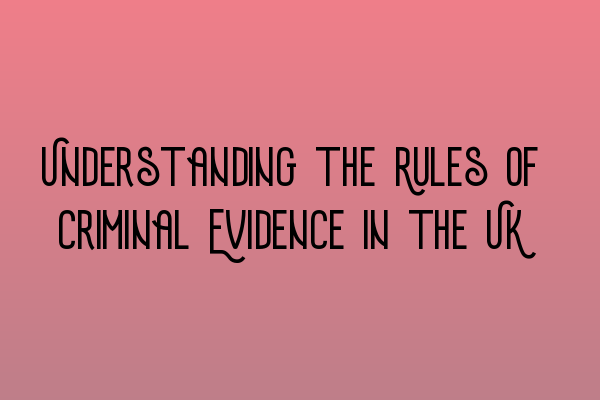Understanding the Rules of Criminal Evidence in the UK
When it comes to criminal law in the United Kingdom, the rules of evidence play a crucial role in ensuring a fair and just trial. The rules surrounding criminal evidence dictate what types of evidence can be presented in court, how it can be presented, and how it should be evaluated by the judge or jury. As an aspiring solicitor preparing for the SQE exam, it is essential to have a deep understanding of these rules. In this blog post, we will demystify the rules of criminal evidence in the UK and explore their importance in the criminal justice system.
The Admissibility of Evidence
One of the key aspects of the rules of criminal evidence is determining the admissibility of evidence. Admissibility refers to whether evidence can be presented in court and considered by the judge or jury. The admissibility of evidence is governed by various legal principles, including relevance, hearsay, character, and expert opinion.
Relevance is a fundamental principle in criminal evidence. Evidence is considered relevant if it has any tendency to make a fact more or less likely in the case. It is crucial to present evidence that is directly related to the issues in the trial to avoid any unnecessary confusion or prejudice.
Hearsay is another important concept in criminal evidence. Hearsay refers to an out-of-court statement being used to prove the truth of the matter asserted. Generally, hearsay evidence is not admissible unless it falls under an exception, such as a dying declaration or a statement made against interest. Understanding these exceptions is vital to properly evaluate the admissibility of hearsay evidence.
The character of the accused or the victim is also subject to specific rules. Generally, evidence of a person’s character or reputation is not admissible to prove that they acted in accordance with that character on a particular occasion. However, there are exceptions to this rule, such as when the character of the accused is directly relevant to the case, such as in cases involving sexual assault.
Expert opinion evidence is another significant aspect of criminal evidence. Expert witnesses are individuals who possess specialized knowledge in a particular field that is relevant to the case. Their opinions can assist the judge or jury in understanding complex matters. However, their evidence must meet certain criteria, including being based on a reliable scientific or technical principle.
Evaluating Evidence
Once the evidence is deemed admissible, it is crucial to evaluate its probative value. The probative value of evidence refers to its tendency to prove or disprove a fact in dispute. This evaluation is essential for both the prosecution and the defense.
When evaluating evidence, the judge or jury must consider its reliability, credibility, and consistency. They must assess whether the evidence is trustworthy and free from any potential bias or prejudice. In some cases, corroborative evidence may also be necessary to establish the reliability of certain evidence.
It’s important to note that the rules of criminal evidence are not set in stone and can vary depending on the jurisdiction and the specific case. Therefore, it is vital for solicitors and legal professionals to stay updated with the latest developments in criminal evidence laws.
Conclusion
Understanding the rules of criminal evidence is crucial for any aspiring solicitor in the UK. The admissibility and evaluation of evidence play a significant role in determining the outcome of a criminal trial. By familiarizing yourself with the principles of relevance, hearsay, character, expert opinion, and probative value, you will be better equipped to navigate the complexities of criminal law.
To prepare for the SQE exam and enhance your knowledge of criminal evidence, be sure to check out these related articles:
- SQE Exam Prep: Essential Study Materials for Aspiring Solicitors
- Demystifying the Solicitors Qualifying Examination Format
- SQE Exam for International Lawyers: Challenges and Success Strategies
- LLC Formation Made Simple: Step-by-Step Guide for UK Entrepreneurs
- LLC Formation: A Step-by-Step Guide for UK Entrepreneurs
